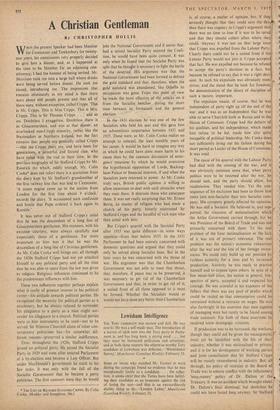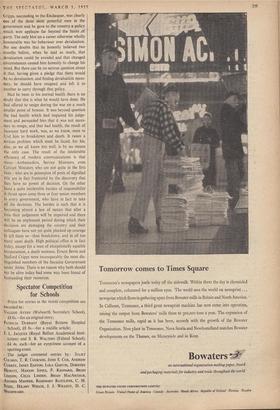A Christian Gentleman
By CHRISTOPHER HOLLIS
WHEN the present Speaker had been Member for Cirencester and Tewkesbury for twenty- one years, his constituents very properly decided to give him a dinner, and, as I happened at the time to be Member for an adjoining con- stituency, I had the honour of being invited. Mr. Morrison took me into a large hall where drinks were being served before dinner. He took me round, introducing me. The impression that remains obstinately in my mind is that there were about 600 people present and that all of them were, without exception, called Cripps. 'This is Mr. Cripps. This is Miss Cripps. This is Mrs. Cripps. This is Sir Thomas Cripps . .' and so on. Doubtless I exaggerate. Doubtless there is in Gloucestershire, and was at that dinner, an overlooked non-Cripps minority, rather like the Nationalists in Northern Ireland, but the fact remains that people are generally called Cripps —that the Cripps there are, and have been for generations, a powerful and fecund clan, who have ruled with the rod in their time. In the previous biography of Sir Stafford Cripps by Mr. Estorick (to which, oddly enough, Mr. Colin Cooke* does not refer) there is a quotation from the diary kept by Sir Stafford's grandmother of the first railway line that was laid to Cirencester. `A steam engine came up to the station from London for the first time about 9 o'clock,' records the diary. 'It occasioned such confusion and bustle that Papa ordered it back again to Kemble.'
It was never out of Stafford C:ripps's mind that he was the descendant of a long line of Gloucestershire gentlemen. His manners, with his extreme courtesy, were always carefully and impeccably those of a gentleman. Far more important to him was it that he was the descendant of a long line of Christian gentlemen. As Mr. Colin Cooke well brings out, all through the 1920s Stafford Cripps had not yet attached himself to any political party and all the time that he was able to spare from the law was given to religion. Religious influences continued to be the predominant influences with him.
These two influences together perhaps explain what is really of greatest interest in his political career—his attitude towards political parties. He recognised the necessity for political parties as a machinery, but he always refused to surrender his allegiance to a party as a man might sur- render his allegiance to a church. Political parties were to him instruments to be used—not to be served. Sir Winston Churchill alone of other con- temporary politicians has—for somewhat dif- ferent reasons—preserved a similar indifference.
Thus, throughout the .1920s, Stafford Cripps joined no political party. He joined the Socialist Party in 1929 and soon after entered Parliament at a by-election and became a Law Officer. But under MacDonald's government he stuck to his law tasks. It was only with the fall of the Socialist Government that he became a party politician. The first rumours were that he would * THE LIFE OF RICHARD STAFFORD CRIPPS. By Colin Cooke. (Hodder and Stoughton, 30s.)
join the National Government and it seems that. had a united Socialist Party entered the Coali- tion, he would have been quite content. It was only when he found that the Socialist Party was split that lie thought it necessary to fight the battle of the •deserted. His argument was that the National Government had been formed to defend the gold standard and that, therefore, when the gold standard was abandoned, like Othello its occupation was gone. From this point of view he made the most effective of the attacks on it from the Socialist benches during the short time between its formation and the general election.
ln the 1931 election he was one of the few Socialists who held his seat and this gave him an adventitious importance between 1931 and 1935. These were, as Mr. Colin Cooke makes no attempt to conceal, the least sensible years of his career. It would be hard to imagine any way in which he could have done more harm to his cause than, by the constant discussion of emer- gency measures by which he would overcome the hypothetical opposition of Lords, Bucking- ham Palace or financial interests, if and when the Socialists were returned to power. As Mr. Cooke truly says, British public opinion is willing to allow statesmen to deal with such obstacles when they meet them. It distrusts those who anticipate them. It was not really surprising that Mr. Ernest Bevin, an enemy of religion who had made a churCh of his party, bitterly mistrusted Sir Stafford Cripps and the handful of rich men who then acted with him.
But Cripps's quarrel with the Socialist Party after 1935 was quite different—in some ways opposite—from that before 1935. In the 1931 Parliament he had been entirely concerned with domestic questions and argued that they could only be solved along Socialist lines. But in the later years he was concerned with the threat of war. His argument was that the Chamberlain Government was not able to meet that threat, that, therefore, if peace was to be preserved, it was necessary to get rid of the Chamberlain Government and that, in order to get rid of it, a united front of all those opposed to it must be formed. Whether the Socialists would or would not have done any better than Chamberlain
is, of course, a matter of opinion, but, if they seriously thought that they could save the day, then there was cogency in Cripps's argument that there was no time to lose if it was to be saved and that they should collect allies where they could. Anyway it was not on that large issue that Cripps was expelled from the Labour Party. Clearly there could not be a united front if the Labour Party would not join it. Cripps accepted that fact. He was expelled not because he refuse to accept. the party's decision as a fact, bu because he refused to say that it was a right dec sion. As such his expulsion was obviously mono strous, and the stand that he. took for freedom,. the demonstration of the idiocy of discipline of such a nature, important.
The expulsion meant, of course, that he was independent of party right up till the end of the, war, and it was as an Independent that he was able to serve Churchill both in Russia and in the House of Commons. Cripps had the defects of his qualities, and his independence, which made him refuse to be led, made him also quite incapable of political leadership. Mr. Cooke does not sufficiently bring out his failure during his shore period as Leader of the House of Commons. It was total.
The cause of his quarrel with the Labour Party had died with the coming of the war, and it was obviously common sense that, when party politics were to be resumed after the war, he should seek, and the party should allow, his readmission. They needed him. Yet the con- sequence of his exclusion had been to throw him more into non-Socialist than into Socialist com- pany. His company greatly affected his opinions. He was still a Socialist. He believed in, and sup- ported,
the measures of nationalisation which the Attlee Government carried through, but he was President of the Board of Trade and was not primarily concerned with theM. To the real problerh of the hour nationalisation or the lack of it was not of primary relevance. The real problem was the nation's economic exhaustion after the war and the loss of her foreign invest- ments. We could only build up our position by ruthless austerity for a time and by increased production. Austerity he was ready to practise himself and to impose upon others. In spite of a few music-hall jokes, the nation in general, irre- spective of party, accepted it and respected his courage. He was scornful in his exposure of the fallacy that there was any pool of profits which could be raided so that consumption could be restrained without a restraint on wages. He was also forthright in his assertion that men capable of managing were but rarely to be found among' trade unionists. For both of these assertions he
received some demagogic criticism. 1 If production was to be increased, the workers, though they could not be given the management, must yet be identified with the life of their industry, whether it was nationalised or private,. and it is for his development of working, parties and joint consultation that Sir Stafford Cripps will be mainly remembered in industry. But, all through, his policy of restraint at the Board of Trade was in uneasy conflict with the inflationary 'easy money' policy of Dr. Dalton at the;, Treasury. It was an accident which brought about Dr. Dalton's final dismissal, but doubtless he could not have lasted long anyway. Sir Stafford
Cripps, succeeding to the Exchequer, was clearly one of the three most powerful men in the government and he gave to the country a policy which won applause far beyond the limits ..of party. The only blot on a career otherwise wholly honourable was his behaviour over devaluation. No one doubts that he honestly believed two months before, when he said as much, that devaluation could be avoided and that changed circumstances caused him honestly to change his mind. But there can be no serious question about it that, having given a pledge that there would be no devaluation, and finding devaluation neces- sary, he should have resigned and left it to another to carry through that policy.
Had he been in his normal health there is no doubt that this is what he would have done. He had offered to resign during the war on a much smaller point of honour. It was beyond question the bad health which had impaired his judge- ment and persuaded him that it was not neces- sary to resign, and that bad health, the result of incessant hard work, was, as we know, soon to lead him to breakdown and death. It raises a serious problem which must be faced, for his, alas, as we all know too well, is by no means the only case. The result of the intolerable efficiency of modern communications is that many—Ambassadors, Service Ministers, even Cabinet Ministers who are not quite in the first rank—who are in possession of posts of dignified title are in fact frustrated by the discovery that they have no power of decision. On the other hand a quite intolerable burden of responsibility is thrust upon some three or four senior members in every government, who have in fact to take all the decisions. The burden is such that it is becoming almost a law of nature that after a time their judgement will be impaired and there will be an unpleasant period during which their decisions are damaging the country and their colleagues have not yet quite plucked up courage to tell them so—then breakdown, and in all too many cases death. High political office is in fact today, except for a man of exceptionally equable temperament, a death sentence. Ernest Sevin and Stafford Cripps were incomparably the most dis- tinguished members of the Socialist Government tinder Attlee. There is no reason why both should not be alive today had some way been found of husbanding their resources.



































 Previous page
Previous page